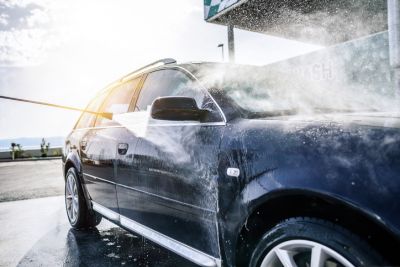


A self-serve car wash can be a slippery place. Navigating water, soap, and (in cold temperatures) ice are all natural parts of the process. But they can also create hazards that result in serious injury. Now a Michigan Court of Appeals decision says that a car wash injury could trigger no-fault benefits because the user was performing necessary maintenance of the vehicle.
There’s more to using a company car than free gas mileage. When your employer allows you to use a vehicle and provides the insurance, you know you had better take care of it.
Ms. Woodring was doing just that. On a brisk day in early February, she was cleaning the company car at a self-serve spray car wash when she slipped and fell, suffering serious injuries. The car, meanwhile, was still running, but in “park”. Woodring filed a claim for no-fault benefits with her employer’s insurer, Phoenix Insurance Company, but it denied the claim, saying her slip-and-fall accident had nothing to do with the vehicle.
Woodring v Phoenix Ins Co has been up and down the Michigan court system already. The most recent published decision, coming out of the Michigan Court of Appeals, dealt with whether a car wash injury could trigger no-fault benefits when the vehicle being washed was parked.
The Michigan No-Fault Act covers all injuries “arising out of the ownership, operation, maintenance or use of a motor vehicle as a motor vehicle. . . .” MCL 500.3105(1). But when a vehicle is parked, the law says No-Fault liability doesn’t apply unless:
a) The way the vehicle was parked created an unreasonable risk of injury (like being parked on a hill without the parking brake engaged)
b) The injury was caused by the use, loading, or unloading, of equipment permanently mounted to the vehicle (like the lift bed on the back of a truck)
c) The injury happened while the person was inside, getting into, or getting out of the parked vehicle. MCL 500.3106(1)
It was up to the court to decide if maintenance of a parked vehicle resulting in a car wash injury would trigger no-fault benefits, or whether the vehicle would be considered parked.
The Woodring court looked back at an earlier case, Miller v Auto-Owners Ins Co, 411 Mich 633; 309 NW2d 544 (1981), which said that “’maintenance’ of a parked vehicle will, at least under some circumstances avoid triggering [the parked vehicle exclusion].” It said because most maintenance requires the vehicle to be parked, including the word maintenance in the general No-Fault liability statute would be unnecessary if law makers wanted to exclude it anytime the vehicle was parked. However, the court did distinguish between maintenance related to the “transportational function” of the vehicle and other forms of upkeep.
The court then clearly defined washing your car as necessary maintenance related to the transportational function of the vehicle:
“Clearly, just as Michigan residents are completely expected to have some awareness of the practical implications of snow and ice, any Michigan resident would be aware that keeping their cars clean keeps them running longer and without danger. Considering the condition of our roads and the salt used for snow and ice on our roads, cleaning a car is essential to be able to see while driving.”
Just in case the Michigan Supreme Court disagreed with the decision that a car wash is maintenance, the Court of Appeals also determined that there was some question about whether the car was actually parked.
In everyday life, a car is parked when its gear is set to “Park” and it is turned off, essentially becoming no different from any other property on the side of the road. But in law, sometimes you have to split some hairs. In this case, because the vehicle was still running, and Ms. Woodring was working in its immediate area, the court said there was some question whether the vehicle was “parked” at all. It said if washing a car did not count as maintenance then that question would need to go back to the jury.
When the Michigan Supreme Court considered Woodring, it sent the case back down for more consideration. Specifically, the higher court wanted to know if the trial court judge thought there was a “causal connection between the plaintiff’s injuries and the maintenance of a motor vehicle as a motor vehicle [that] is more than incidental, fortuitous, or ‘but for’.” In other words, being close to a car that is being serviced isn’t enough to trigger No-Fault benefits. The injury must be connected to the vehicle maintenance itself.
The Court of Appeals said it was. Ms. Woodring was actively engaged in performing the maintenance, which itself likely caused the water or ice buildup that caused her fall. At the very least, she was unable to take care where she was walking because she was busy washing the company vehicle. The court said that was enough of a causal connection to allow the car wash injury to trigger no-fault benefits.
Not every auto accident resulting in no-fault benefits fits into a neat category. When your case raises questions about which category applies, such as whether a car wash counts as maintenance or if your car was parked, you need personal injury attorneys with the experience to guide the courts to the right answers. At Sachs Waldman, our team has decades of experience handling difficult no-fault issues. If you have been seriously injured in a car accident, contact our Detroit personal injury law office at 1-800-638-6722.
© 2025 Michigan Injury Attorneys
View Our Disclaimer | Privacy Policy
Detroit Personal Injury & Car Accident Attorneys